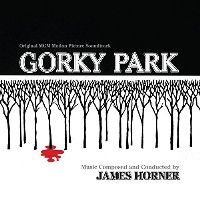- Composed by James Horner
- Intrada / 2014 / 79m (score 43m)
Adapted from Martin Cruz Smith’s popular novel, Gorky Park follows a Russian policeman’s pursuit of the perpetrator of a triple murder, a pursuit that exposes a web of corruption and intrigue. Directed by Michael Apted from a screenplay by Dennis Potter, and starring William Hurt, Lee Marvin and Brian Dennehy, it’s an excellent film, a refreshingly different thriller, and it remains a compelling watch over three decades later.
The film received an early score from James Horner, one of eight he did in 1983. He was at the start of his career but had already found some success and acclaim – he had already built up a diverse array of projects, including box office success on Star Trek II and 48 Hours – and he wrote a fascinatingly unusual score for this film, which as John Takis writes in his excellent liner notes is all about colour. The striking main title piece sums the score up nicely – a cacophonous blast of thriller, mixing an 80s drum kit with the orchestra, competes for attention with an excerpt from Tchaikovsky’s “Swan Lake”, goes through a hint of “La Marseillaise”, back to “Swan Lake”, always with Horner’s own main theme dropping in and out – it’s ingenious and works brilliantly in the film, where it shows a master film composer at work.
Much of the score that follows is action-dominated, and that action is very much in the style of 48 Hours and the later Commando, insistent brassy bursts combining with drum kit – it’s rooted in its time of course, but it’s uniquely James Horner and very effective. “Irina’s Chase” is a little different, with a slower pace and a great deal of colour from balalaika and cimbalom, mixing eerie suspense into the action – it gets more urgent as it goes on, the tension never lets up – it’s a great piece.
The score’s other great asset is the absolutely gorgeous “Irina’s Theme”, so delicate, almost gossamer-like, appearing several times through the score, the unique colour of the EVI combining with sparsely-orchestrated harp, strings and winds and giving it a dreamlike quality. It’s full of yearning, heartbreakingly beautiful and one of the most delicately moving pieces of the composer’s long and glorious career. Horner had planned to use it for the finale, and that appears on the album as “Releasing the Sables”, where it takes on a new identity, joyous and happy and bringing closure to the score and (as intended) the film, though it was actually dialled out in favour of Tchaikovsky.
The score has had numerous releases before, all featuring the same selection of music (albeit not always in the same sequence) but Intrada’s 2014 release is by far the best. There’s a lot of additional music, leading to an intelligent album sequencing where the most musically-coherent programme is presented first, mixing film and album takes and running about 43 minutes, before various alternative takes and source music are heard to fill up the CD. Just as importantly, there is a significant upgrade on the sound, allowing the music to breathe much more naturally. It’s a clever score, with a lot going for it, including a great array of colours. Even if you own one of the earlier releases, all Horner fans will welcome the upgrade.
Rating: ****
facebook.com/moviewave | twitter.com/MovieWaveDotNet | amazon.com













half * extra when entering in the review!! 🙂 (it’s ***1/2 in the listing page)